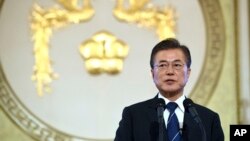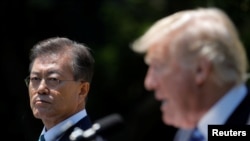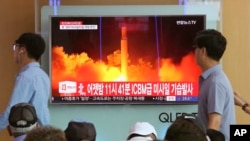South Korean President Moon Jae-in Thursday said he has received assurances from U.S. President Donald Trump that Washington would not launch any attack against North Korea without Seoul’s approval.
“The United States and President Trump have declared and promised that whatever military action they would like to take, they will fully discuss it with us and get our consent,” Moon said.
The South Korean president held a press conference in Seoul to mark the first 100 days of his administration. The liberal Moon was elected to office in May following the impeachment of conservative President Park Geun-hye, who was ousted from office for her alleged involvement in a multimillion-dollar corruption scandal.
In contrast to his predecessor, who had carefully scripted responses to pre-approved questions during news conferences, Moon answered spontaneously but still carefully avoided potential areas of disagreement with the U.S.
President Moon has advocated for reducing tensions on the Korean Peninsula though dialogue and engagement, in what seems a sharp difference in tone and emphasis to President Trump’s “fire and fury” confrontational rhetoric and “maximum pressure” policy that stresses the possible use of force to prevent North Korea from developing a nuclear intercontinental ballistic missile (ICBM) that could threaten the U.S.
“President Moon’s position is delicate. He does not want to come out and show some kind of gap with his ally the United States, even when President Trump is using escalatory language and talking about war options that are totally inimitable to the interest of the vast majority of South Koreans,” said John Delury, international relations professor at Yonsei University in Seoul.
Plan postponed
A potential U.S., North Korea conflict was averted this week when Kim Jong Un postponed a plan to target a ballistic missile near the U.S. territory of Guam in the Pacific ocean. But the inflammatory threats made by both Trump and North Korea have raised anxiety that the two sides were on the brink of a war that would put the lives of millions of South Koreans at risk.
“President Trump is trying to pressure North Korea by showing firm determination. It doesn’t need to be done with a willingness to implement military action. In this regard, South Korea and the U.S. are in full communication and discussions,” President Moon said.
Instead, the South Korean President focused on areas of agreement:
- That North Korea must be stopped from developing a fully functioning ICBM capability. Such a development, Moon said, would cross a “red line” and raise the risk of military conflict.
- But both agree on increasing economic pressure on North Korea as the primary means to force Pyongyang to agree to denuclearization talks. President Moon called “unprecedented” the recently increased U.N. sanctions that ban the export of North Korean coal and other key minerals, and that could deprive the Kim regime of $1 billion a year to fuel its illicit nuclear and ballistic missile program.
- The South Korean president also voiced support for strong military deterrence, but he did not specifically mention the U.S., South Korea joint military exercises scheduled for next week, that North Korea has in the past condemned as “rehearsals for invasion.”
Mixed U.S. messages
During his visit to Beijing Thursday, General Joseph Dunford, chairman of the U.S. Joint Chiefs of Staff, said scaling back the military exercises is not currently on the negotiating table with North Korea.
In Chile Wednesday, U.S. Vice President Mike Pence again emphasized that “all options” remained on the table with regards to North Korea, and he called on Latin American nations to break ties with Pyongyang.
But White House chief strategist Steve Bannon said there was “no military solution” to North Korea’s nuclear threats because of Pyongyang’s massed artillery targeting the South Korean capital.
China, North Korea’s main ally and trading partner, has repeatedly urged Pyongyang to halt its weapons program and at the same time urged South Korea and the United States to stop military drills in order to lower tensions.
Youmi Kim contributed to this report.









